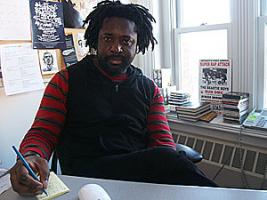Novel explores the horror of West Indian slavery
by Euan Kerr, Minnesota Public RadioFebruary 26, 2009
Writer Marlon James is being hailed as a new voice of Jamaican literature - which is pretty remarkable given he lives in St Paul.
St. Paul, Minn. — He was born in Kingston Jamaica, and now teaches literature and creative writing at Macalester College.
His new novel "The Book of Night Women" is the story of Lilith, a young slave living on a brutal Jamaican plantation in the year 1800. His writing has been compared with Zadie Smith, Edwidge Dandicat and Junot Diaz, who have all written of the legacy of colonialism around the Caribbean.
James says "The Book of Night Women" started as another story, set 30 years later, after the end of slavery in Jamaica. He told Minnesota Public Radio's Euan Kerr he was writing about a woman accused of murder, when, as James puts it, the story got hijacked.

Marlon James in his office at Macalester College where he teaches literature and creative writing. (MPR photo/Euan Kerr)
__________________________________
Womanchild in the Oppressive Land

Marlon James’s second novel is both beautifully written and devastating. While the gruesome history of slavery in the Americas is a story we may dare to think we already know, every page of “The Book of Night Women” reminds us that we don’t know nearly enough. James’s narrative, related in a hard-edged but lilting dialect, takes us back to the cruel world of a Jamaican sugar plantation at the turn of the 19th century.
THE BOOK OF NIGHT WOMEN
By Marlon James
417 pp. Riverhead Books. $26.95
Yet while his cast includes sadistic plantation owners and vicious overseers, “house Negroes” and field slaves, James deftly avoids the clichéd melodrama such characters all too often inspire. He never draws rigid lines between good and evil, and he never takes sides.
At the center of “The Book of Night Women” is a black-skinned, green-eyed slave woman, barely out of childhood, who struggles to transcend the violence into which she is born, a violence that begins with her first breath as a “baby wash in crimson and squealing like it just depart heaven to come to hell.” Orphaned when her mother dies giving birth to her, Lilith more or less raises herself in the hell of the Montpelier Estate, a closed and brutal society all its own, where nothing is as it seems and nearly everyone has secrets to conceal.
Deformed by the perverse intimacy of a system that has transformed people — both white and black — into animals, this is a place where, paradoxically, true closeness, be it of love or even solidarity, is hard to come by.
Yet Lilith has an opportunity to shed her isolation when she’s invited to join the Night Women, a clandestine slave sisterhood conspiring to stage an islandwide revolt. These women awaken in Lilith a “true darkness and true womanness,” revealing to her a purpose of which she has been unaware. But although Lilith’s name bears a timeless symbolic charge, she will not become the heroine the Night Women — or we — would like her to be.
Lilith is convinced that her green eyes, proof that her father was a white man, make her not only special but better than other slaves. Shamelessly affirming that the “arrow from ugly to pretty was from black to white,” she has aspirations far beyond what the Night Women can offer. Vain and foolish, impetuous and ungrateful, Lilith refuses to ally herself with her would-be sisters, and so ends up learning painful lessons all on her own.
Although Lilith rarely behaves as she “should,” she’s convincing and consistent in her belief that despite her lowly status as a slave and a woman, she has the right to want more: “Sometimes she wish the great God would come and flood out every body again. The field, the estate and the county. The country and the world. Maybe everybody start again and slave is free and free is slave.”
Ultimately, Lilith is a slave who will not be a victim, a mulatto who will not be tragic. And for this she is brutally beaten, becoming known as “the woman with the quilt on her back.” Yet despite her suffering, she insists that “scar only make the skin stronger,” and that “there be no whip, in hands or in a pants, that goin’ knock her down again.”
Significant parts of “The Book of Night Women” are, understandably, very difficult to read. Rape, torture, murder and other dehumanizing acts propel the narrative, never failing to shock in both their depravity and their humanness. It is this complex intertwining that makes James’s book so disturbing and so eloquent. Writing in the spirit of Toni Morrison and Alice Walker but in a style all his own, James has conducted an experiment in how to write the unspeakable — even the unthinkable. And the results of that experiment are an undeniable success.
Kaiama L. Glover teaches French and Francophone literature at Barnard College.
>via: http://www.nytimes.com/2009/03/01/books/review/Glover-t.html?_r=2&scp=1&a...

